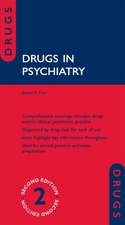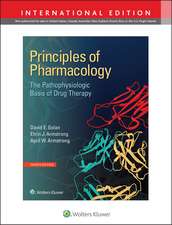Opiate Receptors and Antagonists: From Bench to Clinic: Contemporary Neuroscience
Editat de Reginald Dean, Edward J. Bilsky, S. Stevens Negusen Limba Engleză Hardback – 9 mar 2009
| Toate formatele și edițiile | Preț | Express |
|---|---|---|
| Paperback (1) | 1122.94 lei 6-8 săpt. | |
| Humana Press Inc. – 19 noi 2010 | 1122.94 lei 6-8 săpt. | |
| Hardback (1) | 1124.07 lei 6-8 săpt. | |
| Humana Press Inc. – 9 mar 2009 | 1124.07 lei 6-8 săpt. |
Din seria Contemporary Neuroscience
- 5%
 Preț: 1128.63 lei
Preț: 1128.63 lei - 18%
 Preț: 965.52 lei
Preț: 965.52 lei - 5%
 Preț: 1108.35 lei
Preț: 1108.35 lei - 18%
 Preț: 1228.15 lei
Preț: 1228.15 lei - 18%
 Preț: 1229.73 lei
Preț: 1229.73 lei - 18%
 Preț: 1231.64 lei
Preț: 1231.64 lei - 18%
 Preț: 945.47 lei
Preț: 945.47 lei - 18%
 Preț: 1244.08 lei
Preț: 1244.08 lei - 15%
 Preț: 638.76 lei
Preț: 638.76 lei - 18%
 Preț: 1240.47 lei
Preț: 1240.47 lei - 18%
 Preț: 1385.99 lei
Preț: 1385.99 lei - 18%
 Preț: 1227.84 lei
Preț: 1227.84 lei - 18%
 Preț: 1220.88 lei
Preț: 1220.88 lei - 18%
 Preț: 961.55 lei
Preț: 961.55 lei - 15%
 Preț: 695.70 lei
Preț: 695.70 lei - 18%
 Preț: 959.82 lei
Preț: 959.82 lei - 5%
 Preț: 1112.17 lei
Preț: 1112.17 lei - 18%
 Preț: 1233.83 lei
Preț: 1233.83 lei - 18%
 Preț: 950.96 lei
Preț: 950.96 lei - 24%
 Preț: 799.51 lei
Preț: 799.51 lei - 18%
 Preț: 954.77 lei
Preț: 954.77 lei - 18%
 Preț: 1227.21 lei
Preț: 1227.21 lei - 5%
 Preț: 1117.46 lei
Preț: 1117.46 lei - 18%
 Preț: 1248.02 lei
Preț: 1248.02 lei - 18%
 Preț: 949.10 lei
Preț: 949.10 lei - 5%
 Preț: 1114.35 lei
Preț: 1114.35 lei - 15%
 Preț: 694.22 lei
Preț: 694.22 lei - 18%
 Preț: 950.52 lei
Preț: 950.52 lei - 5%
 Preț: 1117.10 lei
Preț: 1117.10 lei - 24%
 Preț: 1089.45 lei
Preț: 1089.45 lei - 18%
 Preț: 1227.52 lei
Preț: 1227.52 lei - 18%
 Preț: 955.08 lei
Preț: 955.08 lei - 5%
 Preț: 1417.38 lei
Preț: 1417.38 lei
Preț: 1124.07 lei
Preț vechi: 1183.22 lei
-5% Nou
Puncte Express: 1686
Preț estimativ în valută:
215.12€ • 233.58$ • 180.70£
215.12€ • 233.58$ • 180.70£
Carte tipărită la comandă
Livrare economică 22 aprilie-06 mai
Preluare comenzi: 021 569.72.76
Specificații
ISBN-13: 9781588298812
ISBN-10: 1588298817
Pagini: 757
Ilustrații: XXIII, 757 p.
Dimensiuni: 155 x 235 x 41 mm
Greutate: 1.16 kg
Ediția:2009
Editura: Humana Press Inc.
Colecția Humana
Seria Contemporary Neuroscience
Locul publicării:Totowa, NJ, United States
ISBN-10: 1588298817
Pagini: 757
Ilustrații: XXIII, 757 p.
Dimensiuni: 155 x 235 x 41 mm
Greutate: 1.16 kg
Ediția:2009
Editura: Humana Press Inc.
Colecția Humana
Seria Contemporary Neuroscience
Locul publicării:Totowa, NJ, United States
Public țintă
Professional/practitionerCuprins
Opioid Receptors.- Ultra-Low-Dose Opioid Antagonists Enhance Opioid Analgesia and Reduce Tolerance.- Upregulation of Opioid Receptors.- Imaging Human Brain Opioid Receptors: Applications to Substance Use Disorders.- Opioid Receptor Antagonist-Mediated Signaling in the Immune System.- Opioid Antagonists: Chemistry and Pharmacology.- The Chemistry and Pharmacology of ?-Opioid Antagonists.- Medicinal Chemistry of Kappa Opioid Receptor Antagonists.- The Chemistry and Pharmacology of Delta Opioid Antagonists.- Novel Opioid Antagonists with Mixed/Dual Selectivity.- Experimental Utility and Clinical Potential of Irreversible Opioid Antagonists.- Methylnaltrexone: A Peripherally Acting Opioid Antagonist.- Substance Abuse.- Opioid Antagonist Effects in Animal Models Related to Opioid Abuse: Drug Discrimination and Drug Self-Administration.- Naltrexone for Initiation and Maintenance of Opiate Abstinence.- Ultra-Low-Dose Naltrexone Decreases Dependence and Addictive Properties of Opioids.- Can a Combination Formulation Containing a Neutral Opiate Antagonist Decrease the Abuse of ?-Agonist Opiates.- Effects of Opioid Antagonists on the Abuse-Related Effects of Psychomotor Stimulants and Nicotine.- Potential Use of Opioid Antagonists in the Treatment of Marijuana Abuse and Dependence.- Naltrexone in Smoking Cessation: A Review of the Literature and Future Directions.- Alcohol and Ingestive Behaviors.- Opioid Antagonists and Ethanol's Ability to Reinforce Intake of Alcoholic Beverages: Preclinical Studies.- Clinical Use of Opioid Antagonists in the Treatment of Alcohol Dependence.- Preclinical Effects of Opioid Antagonists on Feeding and Appetite.- CNS Opiate Systems and Eating Disorders.- Behavioral Disorders.- Potential Utility of Kappa Ligands in the Treatment of MoodDisorders.- Opioid Antagonists in the Treatment of Pathological Gambling and Kleptomania.- Efficacy of Opioid Antagonists in Attentuating Self-Injurious Behavior.- Pharmacotherapeutic Effects of Opioid Antagonists in Alcohol-Abusing Patients with Schizophrenia.- Medical Indications.- Current Issues in the Use of Opioid Antagonists (Naltrexone for Opiate Abuse: A Re-Educational Tool as Well as an Effective Drug).- Emergency Room Use of Opioid Antagonists in Drug Intoxication and Overdose.- Kappa-Opioid Antagonists as Pruritogenic Agents.- Clinical Effect of Opioid Antagonists on Clinical Pruritus.- Effects of Opioid Antagonists on l-DOPA-Induced Dyskinesia in Parkinson's Disease.- Endocrine Effects of Opioid Antagonists.- Opioid Antagonists in Traumatic Shock: Animal and Human Studies.- The Efficacy of Opioid Antagonists Against Heatstroke-Induced Ischemia and Injury in Rats.- A Review of the Opioid System in Cancer Patients and Preliminary Results of Opioid Antagonists in the Treatment of Human Neoplasms.- Nonclinical Pharmacology of VIVITROL®: A Monthly Injectable Naltrexone for the Treatment of Alcohol Dependence.- The Development of Sustained-Release Naltrexone and Clinical Use in Treating Opiate Dependence.- The Development of ProNeura Technology for the Treatment of Addictions.- Development of Opioid Transdermal Delivery Systems.- Intranasal Naloxone for Treatment of Opioid Overdose.
Recenzii
From the reviews:
“The authors do an excellent job of providing insight into the background of the many factors related to opioid receptor antagonists. … Overall, this work is a well written and interesting text and would be a very useful addition to the personal libraries of those medicinal chemists with a research interest in the modulation of the opioid receptor system.” (Thomas E. Prisinzano, Journal of Medicinal Chemistry, Vol. 53 (2), March, 2010)
“This book is focused on the therapeutic uses of opioid antagonists ranging from classical opioid antagonists to novel chemical entities. In any therapeutic field examined, the aim of book as outlined by the title–‘From Bench to Clinic’–is achieved. … The clinical applications of opioid antagonists are extensively discussed in almost all chapters of this book … . In conclusion, this book gives an interesting analysis of the different fields of knowledge and research concerning therapeutic uses of opioid antagonists in recent years.” (Agostino Marrazzo, ChemBioChem, Vol. 5, 2010)
“The authors do an excellent job of providing insight into the background of the many factors related to opioid receptor antagonists. … Overall, this work is a well written and interesting text and would be a very useful addition to the personal libraries of those medicinal chemists with a research interest in the modulation of the opioid receptor system.” (Thomas E. Prisinzano, Journal of Medicinal Chemistry, Vol. 53 (2), March, 2010)
“This book is focused on the therapeutic uses of opioid antagonists ranging from classical opioid antagonists to novel chemical entities. In any therapeutic field examined, the aim of book as outlined by the title–‘From Bench to Clinic’–is achieved. … The clinical applications of opioid antagonists are extensively discussed in almost all chapters of this book … . In conclusion, this book gives an interesting analysis of the different fields of knowledge and research concerning therapeutic uses of opioid antagonists in recent years.” (Agostino Marrazzo, ChemBioChem, Vol. 5, 2010)
Textul de pe ultima copertă
The evolution in our understanding of Opioid receptors and their subtypes is intimately linked to the development of new pharmacological treatments for diseases and disorders as diverse as addiction, self-injurious behavior, pain, cancer, inflammation, eating disorders, traumatic injury, pruritis and movement disorders. The contributions contained in Opioid Receptors and Antagonists: From Bench to Clinic represent efforts from leading international scientists and clinicians making use of the latest information emerging from the study of the opioid-receptor system. The authors use a variety of experimental and clinical approaches involving the fields of molecular biology, biochemistry, anatomy, pharmacology, behavioral neuroscience and psychiatry to illustrate rapidly developing experimental and therapeutic areas. Highlights include characterization of opioid receptors, chemistry and pharmacology of opiod antagonists for various receptor subtypes (Mu, Kappa, and Delta), discussion of therapeutic uses of opiod antagonists and exploration of innovative approaches to therapeutic drug delivery.
Opioid Receptors and Antagonists: From Bench to Clinic offers a comprehensive view of recent work on opiod antagonist applications and uses in various clinical treatments. Emphasis is placed on disorders of the reward system. This volume serves as reference while also illuminating prospects for future research.
Opioid Receptors and Antagonists: From Bench to Clinic offers a comprehensive view of recent work on opiod antagonist applications and uses in various clinical treatments. Emphasis is placed on disorders of the reward system. This volume serves as reference while also illuminating prospects for future research.
Caracteristici
Summarizes the present understanding of the chemistry, pharmacology and molecular biology of opioid receptors and their subtypes Highlights differences and similarities between the opioid pharmacology of animals and human Describes current and potential therapeutic areas for opioid antagonists, including substance abuse, alcohol and ingestive behaviors, behavioral disorders and other medical indications, supported by nonclinical and clinical evidence Focuses on the development of exciting and innovative drug delivery approaches that are being used with opioid antagonists for the above medical indications




